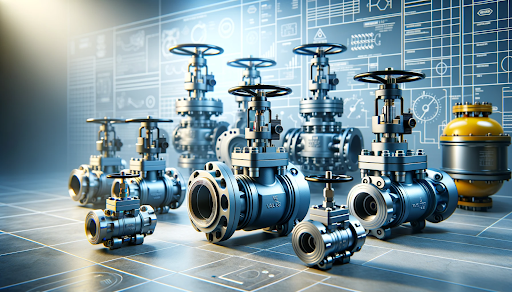How Control Valves Impact Power Performance in Industrial Settings
How Control Valves Impact Power Performance in Industrial Settings
Blog Article

Maximize Power Financial Savings and Convenience With Advanced Building Automation Controls
In the world of modern-day design and center administration, the integration of innovative structure automation controls stands as a pivotal advancement. The merging of innovation and sustainability has birthed a brand-new period where power effectiveness, convenience optimization, and operational streamlining are no more achievable realities however distant ambitions. By taking advantage of the power of automation, buildings can adjust, respond, and evolve in manner ins which were once inconceivable. The potential for considerable energy cost savings and enhanced convenience is not just a promise yet a possibility waiting to be met. This paradigm change in building monitoring holds the vital to opening a world where ecological conscientiousness and occupant health harmoniously exist side-by-side within the walls of our structures.
Power Effectiveness Advantages
Energy efficiency advantages can considerably minimize energy consumption and functional prices in buildings. Energy-efficient systems, such as sophisticated building automation controls, can enhance the use of sources like cooling, lighting, and home heating, leading to lower energy expenditures over time.
Additionally, boosted power effectiveness can lengthen the life expectancy of building tools and systems. By running extra effectively, a/c systems, light, and various other building parts experience less wear and tear, causing decreased upkeep and substitute prices. In addition, energy-efficient buildings typically regulate higher residential or commercial property worths and rental prices, providing long-lasting monetary advantages to owners.
In addition, energy performance can improve owner comfort and performance. Properly controlled interior environments with ideal lights and thermal conditions develop a more positive and conducive office, causing improved employee contentment and performance. On the whole, the energy performance advantages associated with advanced building automation controls are diverse, incorporating cost savings, ecological stewardship, and owner well-being.
Improved Convenience Control
Enhancing comfort control in structure atmospheres requires an advanced combination of innovative automation systems for optimal owner wellness. By making use of sophisticated building automation controls, centers can tailor the interior atmosphere to meet the details requirements and choices of owners. control valves.
By incorporating these advanced controls, structures can not only enhance comfort however likewise boost power efficiency by optimizing system operations based on actual tenancy and usage patterns. Eventually, prioritizing owner convenience with innovative automation systems leads to a much more delightful and healthier interior atmosphere.
Functional Efficiency Improvements

In addition, the application of real-time monitoring and analytics tools enables structure recommended you read drivers to recognize power ineffectiveness and operational abnormalities without delay. By continuously keeping track of power usage patterns and system efficiency metrics, adjustments can be made in real-time to maximize power usage and guarantee peak functional effectiveness. control valves. In addition, including need feedback approaches right into building automation controls can further improve functional performance by dynamically changing energy use based upon grid problems and pricing signals
Indoor Climate Optimization
Reliable indoor climate optimization is a fundamental facet of structure automation controls, guaranteeing passengers' comfort and well-being while making best use of power financial savings. By making use of advanced sensing units and controls, constructing automation systems can continuously check and change temperature level, moisture degrees, air top quality, and air flow to develop an optimum interior setting. Keeping comfortable and regular problems not just enhances passenger complete satisfaction yet also improves efficiency and overall wellness.
Interior climate optimization additionally plays a vital role in power performance. By fine-tuning air flow, heating, and air conditioning systems based on real-time data and tenancy patterns, developing automation controls can substantially reduce energy consumption - control valves. Implementing methods such as demand-controlled ventilation and thermal zoning can help minimize power waste while making certain that each area of the building receives the necessary conditioning.

Lasting Environment Production
Structure automation manages not just enhance indoor environment conditions for power efficiency and resident convenience but also lay the structure for developing a lasting atmosphere with tactical administration Website of sources and systems. By integrating advanced structure automation innovations, such as sensors, actuators, and intelligent software program, facilities can check and change power usage in real-time to minimize waste and decrease their carbon impact. These systems enable anticipating maintenance, identifying possible problems prior to they intensify and enhancing devices performance to boost durability and efficiency.
Additionally, lasting atmosphere production extends beyond energy management to encompass water preservation, waste reduction, and indoor air top quality renovation. Building automation controls can regulate water usage, discover leaks, and make sure proper garbage disposal practices, adding to overall sustainability efforts. important site Additionally, by controlling and keeping track of ventilation and filtering systems, these innovations boost owner wellness and productivity while lowering energy intake related to HVAC procedures.
Conclusion
Finally, advanced building automation manages offer substantial advantages in terms of energy financial savings, comfort control, operational efficiency, interior environment optimization, and creating a sustainable environment. By implementing these controls, structures can attain optimum efficiency while lowering energy usage and enhancing passenger comfort. It is obvious that the usage of advanced automation modern technology is essential in enhancing structure performance and producing a much more lasting future.
Power efficiency advantages can dramatically minimize power usage and functional prices in structures. On the whole, the energy performance benefits linked with sophisticated building automation controls are diverse, incorporating price financial savings, ecological stewardship, and owner wellness.
In addition, including need feedback methods into structure automation controls can better improve operational efficiency by dynamically readjusting power use based on grid problems and pricing signals.
Structure automation controls not just enhance indoor climate problems for energy efficiency and occupant convenience yet additionally lay the foundation for creating a lasting atmosphere with strategic monitoring of resources and systems.In final thought, progressed structure automation controls offer substantial advantages in terms of energy savings, comfort control, functional effectiveness, indoor climate optimization, and developing a lasting setting.
Report this page